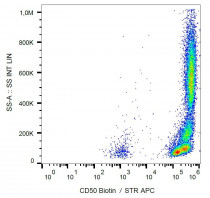ARG62879
anti-CD50 / ICAM3 antibody [MEM-171] (Biotin)
anti-CD50 / ICAM3 antibody [MEM-171] (Biotin) for Flow cytometry and Human
Immune System antibody; Signaling Transduction antibody
Overview
| Product Description | Biotin-conjugated Mouse Monoclonal antibody [MEM-171] recognizes CD50 / ICAM3 |
|---|---|
| Tested Reactivity | Hu |
| Tested Application | FACS |
| Specificity | The clone MEM-171 recognizes an epitope in the D2 domain of CD50 (ICAM-3), a 120-130 kDa type I membrane protein (immunoglobulin supergene family) expressed on leukocytes, endothelial cells and Langerhans cells; it is negative on platelets and erythrocytes. HLDA VI; WS Code BP 614 HLDA VI; WS Code NL N-L022 |
| Host | Mouse |
| Clonality | Monoclonal |
| Clone | MEM-171 |
| Isotype | IgG1 |
| Target Name | CD50 / ICAM3 |
| Antigen Species | Human |
| Immunogen | Human granulocytes |
| Conjugation | Biotin |
| Alternate Names | CD50; CD antigen CD50; Intercellular adhesion molecule 3; ICAM-3; ICAM-R; CDw50; CDW50 |
Application Instructions
| Application Suggestion |
|
||||
|---|---|---|---|---|---|
| Application Note | * The dilutions indicate recommended starting dilutions and the optimal dilutions or concentrations should be determined by the scientist. |
Properties
| Form | Liquid |
|---|---|
| Purification Note | The purified antibody is conjugated with Biotin-LC-NHS under optimum conditions. The reagent is free of unconjugated biotin. |
| Buffer | PBS (pH 7.4) and 15 mM Sodium azide |
| Preservative | 15 mM Sodium azide |
| Concentration | 1 mg/ml |
| Storage Instruction | Aliquot and store in the dark at 2-8°C. Keep protected from prolonged exposure to light. Avoid repeated freeze/thaw cycles. Suggest spin the vial prior to opening. The antibody solution should be gently mixed before use. |
| Note | For laboratory research only, not for drug, diagnostic or other use. |
Bioinformation
| Database Links | |
|---|---|
| Gene Symbol | ICAM3 |
| Gene Full Name | intercellular adhesion molecule 3 |
| Background | CD50 (intracellular adhesion molecule 3, ICAM-3) is a transmembrane glycoprotein expressed by leukocytes, that serves as a counter-receptor for the lymphocyte function-associated antigen (LFA)-1 integrin. Besides functioning as an adhesive molecule that mediates e.g. the contact between T cells and antigen presenting cells, ICAM-3 regulates affinity of LFA-1 for ICAM-1 and induces T cell activation and proliferation. ICAM-3 plays an essential role in the initiation of the immune response both on T cells and antigen presenting cells and interacts also with CD209 (dendritic cell-specific ICAM-3-grabbing nonintegrin, DC-SIGN), a C-type lectin of dendritic cells and macrophages; this process is involved in dialogue between dendritic cells and granulocytes. |
| Function | ICAM proteins are ligands for the leukocyte adhesion protein LFA-1 (integrin alpha-L/beta-2). ICAM3 is also a ligand for integrin alpha-D/beta-2. [UniProt] |
| Research Area | Immune System antibody; Signaling Transduction antibody |
| Calculated MW | 60 kDa |
| PTM | Upon stimulation by a physiologic stimuli becomes rapidly and transiently phosphorylated on serine residues. N-glycosylated; glycans consist of a mixture of tri- and tetra-antennary complex-type chains and high-mannose chains. |
Images (1) Click the Picture to Zoom In








